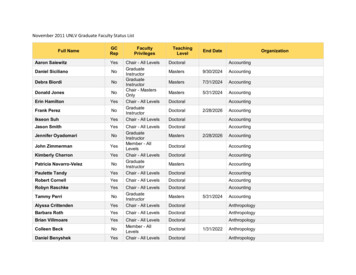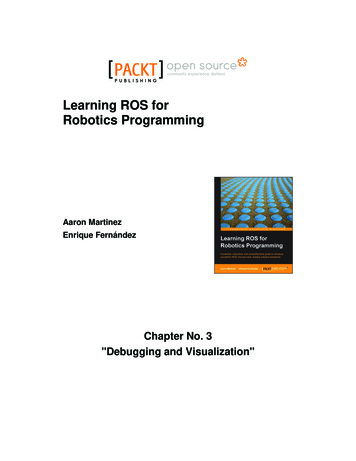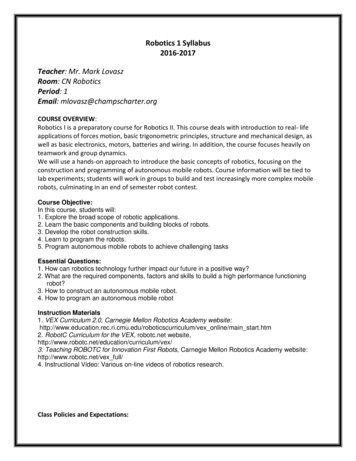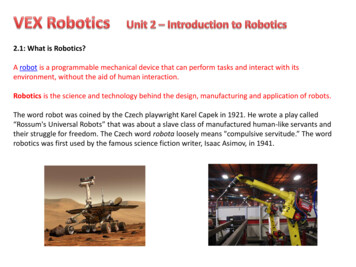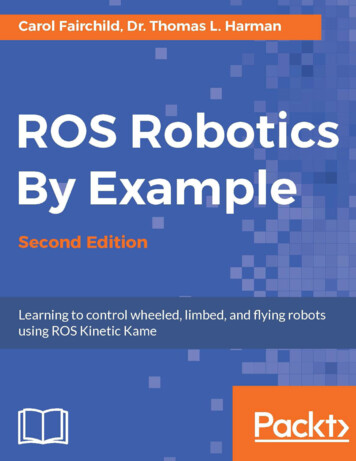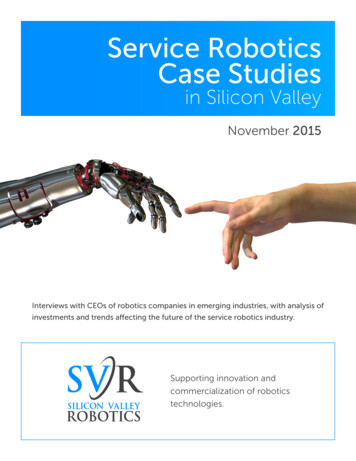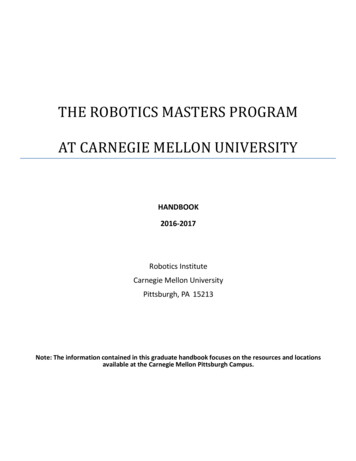
Transcription
THE ROBOTICS MASTERS PROGRAMAT CARNEGIE MELLON UNIVERSITYHANDBOOK2016-2017Robotics InstituteCarnegie Mellon UniversityPittsburgh, PA 15213Note: The information contained in this graduate handbook focuses on the resources and locationsavailable at the Carnegie Mellon Pittsburgh Campus.
Table of ContentsWelcomeMission or PhilosophyDegrees OfferedGraduate Student HandbookCarnegie Mellon Statement of AssuranceThe Carnegie Mellon Codepg. 3pg. 4pg. 5pg. 6pg. 6pg. 6Departmental ResourcesDepartmental PersonnelDepartmental InformationDegree AttainmentCourse of Study and Related Policies/ProtocolsFinancial Supportpg. 7pg. 8pg. 9pg. 10pg. 13AppendicesAppendix A - University resourcesAppendix B – The Wordpg. 15pg. 162
WelcomeWe are proud of the open, friendly culture that has been the hallmark of the Robotics Institute since its inception.Faculty keep their office doors open to encourage informal meetings with students and colleagues. Graduate studentsorganize frequent department-wide social activities, ranging from Friday afternoon get-togethers to rock climbing trips.And the department’s strong support for collaboration creates an ideal environment for world class robotics research.The Robotics Institute is an intellectually diverse, multi-disciplinary department. The Institute’s faculty and studentscome from a wide variety of backgrounds and represent many unique areas of expertise. This diversity stems from themulti-disciplinary nature of the robotics, which encompasses aspects of computer science, mechanical engineering,electrical engineering, psychology, and many other disciplines.The robotics Master of Science program brings together areas of robotics research that would otherwise be spreadacross different departments or separate universities, preparing students to take a leading role in the research anddevelopment of future generations of integrated robotics technologies and systems.Since the start of the Robotics PhD program, we have steadily grown and expanded our programs of study. Today, weoffer diverse opportunities at all levels of education - from masters programs and an undergraduate minor for CarnegieMellon students down to the K-12 level, where our renowned programs, workshops, and summer classes inspire andeducate the next generation of roboticists.While this handbook is specific to your academic experience in the department, there are several other resources andoffices graduate students are encouraged to consult during their tenure at Carnegie Mellon University. Informationabout The Word, the student handbook, the Office of the Assistant Vice Provost for Graduate Education, the Office of theDean of Student Affairs and others are included in Appendix A of this handbook.3
Mission or Philosophy/Brief Overview of DepartmentEven when robotics technologies were relatively primitive, their potential role in boosting the productivity andcompetitiveness of the United States was foreseen in the evolving global marketplace. The Robotics Institute at CarnegieMellon University was established in 1979 to conduct basic and applied research in robotics technologies relevant toindustrial and societal tasks. Seeking to combine the practical and the theoretical, the Robotics Institute has diversifiedits efforts and approaches to robotics science while retaining its original goal of realizing the potential of the roboticsfield.4
Degrees OfferedPhD ProgramsDoctor of Philosophy (PhD) The world's first doctoral program in robotics prepares graduate students to be tomorrow'sleaders in robotics research.Ph.D. SPECIALIZATIONSStudents admitted to the Ph.D. Program in Robotics may choose to further specialize in one of two tracks; M.D. / Ph.D.Program with the University of Pittsburgh Medical Center; Center for the Neural Basis of cognition (CNBC). Thesestudents must also be separately admitted to those programs; they fulfill the same basic requirements as regular Ph.D.students in Robotics but have additional requirements to fulfill. Brochures and catalogs for both specialized programsare available as separate documents from the Graduate Program Coordinator.Center for the Neural Basis of Cognition Option The Center for the Neural Basis of Cognition offers an interdisciplinarytraining program operated jointly with affiliated doctoral programs at Carnegie Mellon University and the University ofPittsburgh. The affiliated programs include Robotics, Computer Science, Psychology, and Statistics at Carnegie Mellon,and Mathematics, Psychology, and the Program in Neuroscience at the University of Pittsburgh.The CNBC option for Robotics Ph.D. students allows them to combine intensive training in RI with a broad exposure tocognitive science, neural computation, and other disciplines that touch on problems of higher brain function.MD / PhD Option Students are first accepted into the M.D. / Ph.D. Program at the University of Pittsburgh MedicalCenter (UPMC), a major medical research institution located within walking distance of the Robotics Institute. After twoyears of medical school, students enter the Ph.D. portion of their program, which typically lasts from 3 - 5 years, beforereturning to finish medical school. At the Robotics Institute, a number of faculty are involved in medically relatedresearch and may serve as the primary Ph.D. advisor. During their first two years of medical school, students normallywork for a 10-week period in one or more laboratories, to determine their choice of Ph.D. advisor. Students apply foradmissions to the Robotics Institute during the fall term of their second year in medical school.Masters ProgramsMaster of Science (RI-MS) A two year master’s program that teaches the fundamentals of robotics theory and practicethrough coursework and independent research.Master of Science - Robotic Systems Development (MRSD) A three-semester advanced graduate degree with a combinedtechnical/business focus for recent- graduates/practicing-professionals engaged in, or wishing to enter, the robotics andautomation field as practitioners in the commercial sector.Master of Science – Computer Vision (MSCV) A 16 month master’s program that teaches the fundamentals of computervision theory to prepare students for careers in industry.Undergraduate ProgramsAdditional Major The Robotics Additional Major is for those undergraduates who want an in-depth understanding ofRobotics Engineering and Science.Undergraduate Minor An undergraduate program that teaches the principles and practice of robotics throughtheoretical studies and hands-on experience with robotics. Graduate Student Handbook5
Graduate Student HandbookUniversity Policies & ExpectationsIt is the responsibility of each member of the Carnegie Mellon community to be familiar with university policies andguidelines. In addition to this departmental graduate student handbook, the following resources are available to assistyou in understanding community expectations: The Word/Student Handbook: demic Integrity Website: www.cmu.edu/academic-integrityUniversity Policies Website: www.cmu.edu/policies/Graduate Education Website: uld you need any of the above resources in a different format, you may contact Barbara Jean (B.J.) Fecich.Please see Appendix A for additional information about The Word and University resources.Carnegie Mellon University Statement of AssuranceCarnegie Mellon University does not discriminate in admission, employment, or administration of its programs oractivities on the basis of race, color, national origin, sex, handicap or disability, age, sexual orientation, gender identity,religion, creed, ancestry, belief, veteran status, or genetic information. Furthermore, Carnegie Mellon University doesnot discriminate and is required not to discriminate in violation of federal, state, or local laws or executive orders.Inquiries concerning the application of and compliance with this statement should be directed to the vice president forcampus affairs, Carnegie Mellon University, 5000 Forbes Avenue, Pittsburgh, PA 15213, telephone 412-268-2056.Obtain general information about Carnegie Mellon University by calling 412-268-2000. The Statement of Assurance canalso be found on-line at: http://www.cmu.edu/policies/documents/SoA.html.The Carnegie Mellon CodeStudents at Carnegie Mellon, because they are members of an academic community dedicated to the achievement ofexcellence, are expected to meet the highest standards of personal, ethical and moral conduct possible.These standards require personal integrity, a commitment to honesty without compromise, as well as truth withoutequivocation and a willingness to place the good of the community above the good of the self. Obligations onceundertaken must be met, commitments kept.As members of the Carnegie Mellon community, individuals are expected to uphold the standards of the community inaddition to holding others accountable for said standards. It is rare that the life of a student in an academic communitycan be so private that it will not affect the community as a whole or that the above standards do not apply.The discovery, advancement and communication of knowledge are not possible without a commitment to thesestandards. Creativity cannot exist without acknowledgment of the creativity of others. New knowledge cannot bedeveloped without credit for prior knowledge. Without the ability to trust that these principles will be observed, anacademic community cannot exist.The commitment of its faculty, staff and students to these standards contributes to the high respect in which theCarnegie Mellon degree is held. Students must not destroy that respect by their failure to meet these standards.Students who cannot meet them should voluntarily withdraw from the university.The Carnegie Mellon Code can also be found on-line: ml6
Department Personnel Andrew Moore, Dean, School of Computer Science Martial Hebert, Director of the Robotics Institute David Wettergreen, Associate Director for Education, Chair of the Robotics Doctoral Program, ResearchProfessor George Kantor, Chair of the Robotics Master’s Program John Dolan, Director of the MS Robotic Systems Development Mel Siegel, Director of the MS Robotics Technology Program Srinivasa Narasimhan, Director of the Master’s Program in Computer Vision Illah Nourbaksh, Associate Director for Faculty, Professor Cheryl Wehrer, Associate Director for Finance & Administration Barbara Jean (B.J.) Fecich, Academic Program Manager: Robotics Master’s Program Suzanne Muth, Academic Program Manager: Robotics Doctoral Program Rachel Burcin, Global Programs Manager: Summer Scholars and MS Robotics Technology Program Sarah Conte, Academic Program Manager: MS Robotic Systems Development and MS Computer Vision Robotics FacultyRobotics Office StaffRobotics Main Office and Phone Number, Newell Simon Hall 4000B, 412.268.3818SCS Computing Facilities Graduate Student Department/College OmbudsmanDavid Wettergreen and George Kantor serve as ombudspersons for graduate students to assist with difficult academic orpersonal situations where a confidential sounding board and/or an intermediary can be helpful. Examples of situationswhere students are encouraged to seek advice or assistance include: Difficulty in communications with advisor, particularly when those difficulties may lead to considering changingadvisors or leaving the program Conflict with other group members that is difficult to resolve within the group Issues related to diversity or the departmental climate for those in groups who are historically underrepresentedin science Personal concerns that interfere significantly with the ability to make timely progress in research or programrequirements. These might be due to health, family or financial challenges. Additionally, students may confer with the university graduate student ombudsman, Suzie Laurich-McIntyre,slaurichmcintyre@cmu.edu, on issues of process or other concerns as they navigate conflicts. Suzie LaurichMcIntyre is the Assistant Vice Provost for Graduate Education.7
Department Information Department Directory Mail – RI does not offer mailboxes for students. Please use your lab address and faculty member’s AdministrativeAssistant to ensure delivery. If you MUST have mail sent to the RI office use: Your Name, RI-MS Student, The RoboticsInstitute, 4000B Newell Simon Hall, Carnegie Mellon University, 5000 Forbes Avenue, Pittsburgh, PA 15213. Let B.J.Fecich know if you are using the departmental address as mail will likely be delivered to her. Mail not picked up aweek after delivery will be returned to sender or discarded. Graduate Student Travel must be approved in advance by the student's advisor. For travel to a conference, approvalmust be obtained before the paper is submitted to the conference; for other travel, approval must be obtainedbefore the student can make a commitment to attend. You can download a form for requesting permission to travel.It is generally expected that the student's advisor, or other faculty member overseeing the travel, will arrange forfunding before granting approval for the travel. Funding must be arranged before the travel request can beapproved. If there are visa concerns for graduate student travel, check the U.S. State Department's Travel & Living Abroad page. Copy, Printing, Faxing ScanningConference & ClassroomsConference & Classroom Audio/Video SupportCreative MediaThe Robotics Creative Media is an online resource available to students who need information regarding HD videoproduction, audio production, design & print, such as business cards, photography, event materials and specialtyitems that can be purchased from the Robotics Store. Emergency SituationsPhone/Fax Usage & InformationRoboOrg – The Robotics Student OrganizationRobotics Institute KitchensSCS Computing GuideWho to See for WhatWomen@SCSDepartment Approach to Press and Media RelationsTo assure consistency in all communications and to maximize external visibility to target audiences the marketing andcommunication staff works together to coordinate key messages and activities involving publicity.The director of media relations in the SCS Dean’s Office, Byron Spice, is the point-of- contact between news media andthe School of Computer Science community, including faculty, students, administrators and staff. He can assist withstrategic planning for publicity, interview preparation, and (depending on the specific project or issue) may assist indeveloping news stories or multi-media for the SCS website and social media channels.8
Degree AttainmentStatute of LimitationsAs outlined in the Master’s Students Statute of Limitations, ntStatuteLimitations.html, students who have matriculated at Carnegie Mellon beginning Fall2012 will complete all requirements for the master’s degree within a maximum of seven years from originalmatriculation as a master’s student, or less if required by a more restrictive department, school or college policy. Oncethis time-to-degree limit has lapsed, the person may resume work towards a master’s degree only if newly admitted to acurrently offered master’s degree program under criteria determined by that program.Under extraordinary circumstances, such as leave of absence, military or public service, family or parental leave, ortemporary disability, a school or college may, upon the relevant department's recommendation and with the writtenapproval of the dean (or designate), defer the lapse for a period commensurate with the duration of that interruption.Students who are pursuing a master’s degree as part-time students for all semesters of their program, as approved bytheir program, may also appeal to their program or department for extension of the time to degree limit.Full-time StatusFull-time status for all students in the Robotics Research Master’s Program is a minimum of 36 units each semester.Master of Science Program Curriculum and Related Policies/ProtocolsThe degree requirements for students in the Robotics Research Master's Program at Carnegie Mellon consist of corecourse requirements, elective courses, and supervised research culminating in a public thesis talk and a Master’s Thesisdocument.The Robotics Research Master's Degree Program is a doorway to a research career, preparing the candidate well fordoctoral degree programs as well as research staff positions at companies and government agencies such as NASA,Mitsubishi and Google. The degree emphasizes course and research qualifications equally, ensuring that the studentattains both breadth of understanding in Robotics together with specialized depth knowledge in an area of particularinterest to the student and faculty advisor. Depth areas are entirely customized to student and faculty joint interests,including for instance Human-Robot Interaction, Haptics, Field Robotics, Robotic Vision, Machine Learning, et cetera.The Program is designed to be completed nominally in two academic years as outlined below, with exceptionaltrajectories as described below for the fifth-year Research Master’s option available to admitted Carnegie Mellonundergraduates, and for Carnegie Mellon staff who are taking courses and conducting research part-time whileperforming staff duties.While there are a limited number of research assistantships available from time to time in the case of faculty withresearch funding for specific Master’s research directions, these are normally awarded at the time when admissionsoccurs; therefore Research Master’s enrollees should expect to arrange funding for their tuition costs for the two yearduration as there is no guarantee of financial support available. Note also that Master’s student frequently choose tospend the summer between Year 1 and Year 2 at Carnegie Mellon, where they continue to pursue research full-time withtheir faculty advisor and are usually paid a stipend for living expenses during this time.The Master’s Thesis requirement is satisfied through the oversight of the Master’s Committee, formed from faculty andstudents at The Robotics Institute who read and approve the Master’s Thesis document and attend and approve thepublic thesis presentation, as described below.Review of ProgressSatisfactory progress in coursework will be assessed by the student keeping up with the course schedule and passingcourses. All courses must be passed with a grade of B-, or better with an overall grade point average of a 3.3 or higher tograduate.9
Elective coursework must be approved by the Master’s program head during the first month of classes in the firstsemester, and prior to class enrollment in all subsequent semesters. The faculty advisor will assign a pass / fail gradeevery semester for the supervised research. To oversee completion of the Master’s thesis requirements the student willform a Master’s Committee that will verify the quality of the Master’s thesis in both written and presentation forms.Faculty AdvisorMaster's students beginning in the fall semester must have a faculty advisor by November 30th; those beginning in thespring semester must have a faculty advisor by March 31st. Students must notify the Master’s program head of theirmutually agreed-upon advisor-advisee relationship with a chosen faculty member. Note that the faculty must have afaculty appointment in the Robotics Institute, and that a faculty accepting the Master’s advisor relationship is neverfinancially responsible for the Master’s student, except in the relatively rare cases when a research assistantship hasbeen explicitly negotiated.Master's CommitteeThe student will form a Master’s Committee consisting of two faculty members and one Robotics Institute Ph.D. studentwho has completed his or her second year of study, or a Ph.D. student who has successfully graduated from the RoboticsResearch Master’s program. The committee should include the student's advisor as well as a second faculty memberfrom a different research group or project than that of the student. The Master’s Committee must be formed during thestudent's first enrolled semester. The Master’s student is expected to hold at least two research meetings with eachmember of the Committee individually, discussing his or her research directions. The student is also expected to deliver acomplete draft Master’s Thesis document to the committee sufficiently in advance of the oral presentation andgraduation to enable committee feedback to be taken into account. The draft document must be disseminated at leasttwo weeks prior to the schedule oral presentation. The oral presentation, in turn, must be scheduled well in advance,and must occur on a weekday before May 7 for spring graduation, August 1 for summer graduation, and December 1 forfall graduation. On-line forms are used (via the BlackFriday site) by the Committee members to report on each researchmeeting with the Master’s candidate and to approve the final Thesis document and Thesis presentation.Course of StudyThe Research Master's Degree requires completion of a minimum of 168 Carnegie Mellon units. Students may enroll for amaximum of 48 units per semester. Of the total units fulfilling the Master’s Degree requirements, at least 84 units mustbe comprised of core and elective coursework, and at least 84 units must be comprised of supervised research. Fourcore courses and three elective courses are required as part of the 84 credit course minimum as described below:Core CoursesFour of the courses must be drawn from the "Core Courses", one course from each of the following four areas. Note thatthis list of core course options is identical to the Core Course list required for the Robotics Ph.D. program at The RoboticsInstitute. Core courses taken during the Research Master’s program can be used to partially fulfill the Core requirementsof the Ph.D. program if the Research Master’s student is later accepted and enrolls in the RI Ph.D. program. Perception: vision, image sensors, range data interpretation, tactile and force sensors, inertial guidance, andother sensors.Core courses in Perception are 16-720 Computer Vision, and 16-722 Sensing and Sensors. Cognition: artificial intelligence for robotics, including knowledge representation, planning, and task scheduling.Core courses in Cognition are 15-780 Graduate Artificial Intelligence, and 10-701 Machine Learning. Action: kinematics, dynamics, control, manipulation and locomotion.Core courses in Action are 16-741 Mechanics of Manipulation, and 16-711 Kinematics, Dynamic Systems and Control. Math Foundations: signal processing, optimal estimation, differential geometry, and operations research.There is one core course in this area: 16-811 Math Fundamentals for Robotics.10
Elective CoursesThe student must take at least 36 units of elective courses, comprising at least 3 elective courses. These can be drawnfrom appropriate graduate courses in Robotics and in related disciplines at Carnegie Mellon. Elective coursework mustbe approved by the Master's program head during the first month of classes in the first semester, and prior to classenrollment in all subsequent semesters. Request approval by e-mailing the program chair and cc'ing B.J. Fecich.Supervised ResearchThe balance of the units, at a minimum of 84 units, will come from supervised research (16-997), which will beconducted in conjunction with a faculty advisor's research program, working with that faculty on one of the on-goingprojects of the laboratory to develop a research thesis question, conduct the research and create the material resultsthat can give form to the Master's Thesis document. Supervised research is graded pass/fail, based on the advisor'sassessment that the student has learned how to contribute to an original research project. Those students who receiveresearch assistantships are expected to satisfy their supervised research requirement by working specifically on theproject from which they receive their funding, and they are expected to enroll for 24 units of 16-997 in any semesterthat they receive funding.Resources and Regulations Governing Research at Carnegie Mellon Office of Sponsored ProgramsOffice of Research Integrity & ComplianceIntellectual Property PolicyPolicy on Restricted ResearchHuman Subjects in Research PolicyFinal Presentation and Thesis DocumentThe student is expected to give an oral thesis presentation in a public venue at Carnegie Mellon. The student is expectedto demonstrate the ability to present technical material to a technical audience that is not presumed to have specificexpertise in the research area. The Master's Committee should be in attendance. The student is also expected to delivera Master's Thesis describing the supervised research. This should be a document for which the student is the sole orprincipal author. The thesis should demonstrate a style, organization and clarity that enable researchers in the field tocomprehend the problem, method, and results of the research. Once approved, the Thesis must be archived as aCarnegie Mellon Technical Report.Carnegie Mellon Staff Enrollees and Undergraduate Fifth-Year EnrolleesCarnegie Mellon staff can enroll in university courses at reduced or zero cost. While this approach to satisfying some ofthe courses for the Research Master’s program is appropriate, staff is encouraged to apply and enroll in the Master’sprogram as early as possible, once they decide to pursue the degree. Before application acceptance, the only Master’srequirements that can be met in advance are Core Course units. Following application acceptance, staff andundergraduates should form their Master’s Committee and mutually select a faculty advisor. This is particularlyimportant for senior undergraduates wishing to begin their Supervised Research units in the summer between seniorand Master’s years, as Supervised Research units will not count toward the Master’s degree unless the student has anapproved Committee and faculty advisor. Elective courses will only count toward the Master’s degree while the studentis enrolled in the Master’s Program. Furthermore, all Research Master’s students must be enrolled in the RoboticsResearch Master’s program for two academic semesters prior to graduation.Carnegie Mellon undergraduates can therefore minimize the time required, enabling a fifth-year Master’s degree, byorganizing their schedule to complete all core courses as an undergraduate, conduct Supervised Research in thesubsequent summer after senior graduation, and then undertake two semesters of Supervised Research and threeelective courses while continuing their Supervised Research. Note that courses at Carnegie Mellon cannot double-counttoward multiple degrees, therefore core courses taken as an undergraduate can only be applied toward the ResearchMaster’s degree if they are not used to satisfy any undergraduate degree requirements.11
The Robotics Immigration CourseThe student’s research education begins in the Robotics Immigration Course, which all Robotics students must attend atthe beginning of their first semester in the program. The Robotics Immigration Course is a series of lectures, discussions,and demonstrations that familiarize the students with Carnegie Mellon and the Robotics Program, introduce theresearch projects and faculty within the Program and affiliated departments, and describe the computational and otherresources available to students in the Program. The Robotics Immigration Course gives students an opportunity to learnwhat it means to conduct research and to get to know the faculty in the Robotics Program.Prerequisites to the Core CoursesIt is each student’s personal responsibility to arrive with, or to acquire rapidly thereafter, basic understanding (at thelevel of an introductory undergraduate course) in the following areas: Mathematics: calculus, linear algebra, numerical analysis, probability and statisticsComputer Science: programming, data structures, algorithmsPhysics and Engineering: mechanics, dynamics, electricity and magnetism, opticsOn request, the faculty will advise incoming students about individually appropriate alternative ways to satisfy theserequirements, e.g., taking an undergraduate course, serving as a TA in an undergraduate course, or self-study by guidedreading and discussion.Transfer Credit / Course WaiverOn the basis of previous related course work, students may apply by completing a waiver request form to waive anycourse. The Chair of the Program will then assign a suitable faculty member to handle the request, typically the relevantcourse instructor or an expert in the topic.In some cases, the faculty may determine that a student has demonstrated significant knowledge of the research area,but not quite sufficient enough to waive the course requirement entirely. In such cases, the faculty may grant aconditional waiver, contingent upon additional work, such as successfully acting as teaching assistant in the course orcompleting a designated project. If a student disagrees with the outcome, he or she may petition the Program Chair toreview the case.Independent StudyIndependent Study (16-995) is a course designed to provide students with an opportunity for intensive study of a subjectthat is either unavailable or insufficiently covered in regular course work. Independent study is not intended tosubstitute for existing courses, but to provide the opportunity for a specialized educational and research experience.Any faculty member in the Robotics Institute is eligible to serve as the supervisor of an Independent Study researchproject. The student must provide a brief prospectus of the project to the faculty supervisor as a basis for reachingagreement on the objectives of the study and provide this to their advisor and to the Program Chair for approval.Grades & GradingPas
The Robotics Institute at Carnegie Mellon University was established in 1979 to conduct basic and applied research in robotics technologies relevant to industrial and societal tasks. Seeking to combine the practical and the theoretical, the Robotics Institute has diversified


